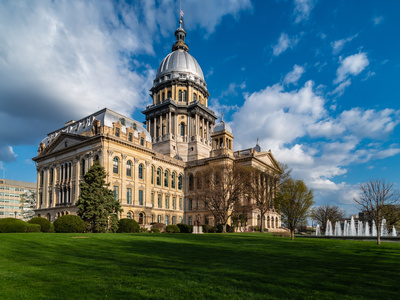-000055-400px.jpeg)
Tax & Budgets, Health Care & Wellness
Here’s How States Are Responding to Trump’s One Big Beautiful Bill Act
October 8, 2025 | Abbie Telgenhof, Morgan Scarboro
April 27, 2021 | Ryan Maness
-31ce62-1200px.jpeg)
Key Takeaways:
While state budget season is still ongoing, no other state is likely to seriously consider more aggressive changes to their tax systems this year than New York and West Virginia have. In New York, Democrats in the legislature were able to push Governor Andrew Cuomo (D) to approve long sought-after taxes on businesses and upper-income individuals. In West Virginia Governor Jim Justice (R) pushed for the Republican-controlled legislature to eliminate the personal income tax, paid for with higher sales tax rate and new taxes on businesses. While there are idiosyncrasies in both cases, each also provides important lessons for state political observers.
Democrats in the New York legislature had spent years pushing for a slate of sweeping tax policy changes. While the overall scope was quite broad (everything from a tax on financial transactions to tax penalties for vacant storefronts), the most recurrent ideas included a “millionaire’s tax”, a pied-à-terre tax on second residences, and a corporate tax rate hike. Even as New York became bluer and the legislature became more progressive, these proposals were stymied either by the lack of a solid majority (see, e.g., the Independent Democratic Caucus) or Governor Cuomo’s tight grip on the state’s fiscal reins.
When Governor Cuomo became embroiled in a series of scandals involving his COVID-19 leadership and allegations of sexual harassment, those tensions boiled over. In his budget package, the governor proposed relatively modest tax changes (AB 3009 / SB 2509), saying that federal aid, marijuana legalization, and a few temporary tax increases would be enough to balance the state’s books. Albany legislators almost always amend the governor’s executive budget proposal, but this year’s legislative initiatives drew a particularly stark contrast. Both the House and Senate proposed permanent higher upper-income tax brackets, a revival of the business capital tax, and new taxes on limited liability entities. It was clear that progressive Democrats, confident in their majority were looking to take on the politically weakened governor and move their long-term agenda.
While the legislature’s budget made new investments in education and small business grants, much of their rhetoric about their taxes didn’t pair the new revenue with new programs. Unlike in Maryland where the novel digital advertising tax was pitched as necessary for major education reforms or in Seattle where officials said the head tax was necessary to fight homelessness, New York lawmakers didn’t have a marquee spending priority. Instead, the refrain was that the wealthy and businesses needed to pay their fair share of taxes.
This isn’t unusual messaging from Democrats, but this is among the most aggressive tax packages ever passed with this as the rationale. This is not to say that COVID-19 didn’t hit New York particularly hard, but between better than expected tax collections and billions in federal aid, the state was not in dire fiscal shape. Nevertheless, Governor Cuomo was forced to sign these new taxes into law.
Part of this story is what happens when a decade-long policy logjam finally breaks, but this also speaks to what a progressive legislature will do when allowed to act on its fiscal priorities.
Governor Justice’s tax reform plan went through several permutations during the 2021 legislative session, but one of the aspects that he remained committed to was the idea that the average West Virginian would need to see a net tax reduction and that business taxes would need to make up a significant portion of the lost revenue. From his State of the State address, to the formal bill introduction (HB 3300), to the compromise plan he unveiled at a legislative summit on April 6, each version called for new taxes on business inputs like advertising and professional services, generally excluded small business owners from the personal income tax relief, and imposed new, tiered severance taxes. When the West Virginia Chamber of Commerce expressed its opposition to these new business taxes and House leadership amended them out entirely, the governor said that businesses needed to help “pull the rope”to ensure that the new burdens didn’t fall on his state’s most vulnerable.
To be sure Governor Justice is a singular political figure, but this is an unusual approach for a Republican governor of a conservative state to take. Proposals to pay for income tax elimination with consumption taxes are not uncommon (they are often based on the Fair Tax), but these bills usually act as political messaging statements from conservative members and rarely get a hearing. In this case, the governor put the full weight of his office behind this idea and a majority of the Republican-controlled House agreed.
We might discount the governor’s actions and rhetoric as a one-off, but they fit into the context of the wider Republican party’s exploration of populist ideas. This is not to say that we should expect Republican state lawmakers to call for higher corporate tax rates en masse, but it might be an additional indicator of a shifting of the political landscape where conservatives and the business community are not as philosophically aligned.
HB 3300 died when West Virginia adjourned its legislative session on April 10, but Governor Justice has been clear that he intends to continue pushing for his tax reform ideas, possibly in a special session. How public and political sentiments shape up around these efforts could be instructive not just for this reform package, but for legislating moving forward.
-000055-400px.jpeg)
October 8, 2025 | Abbie Telgenhof, Morgan Scarboro

August 5, 2025 | Morgan Scarboro

July 30, 2025 | Bill Kramer